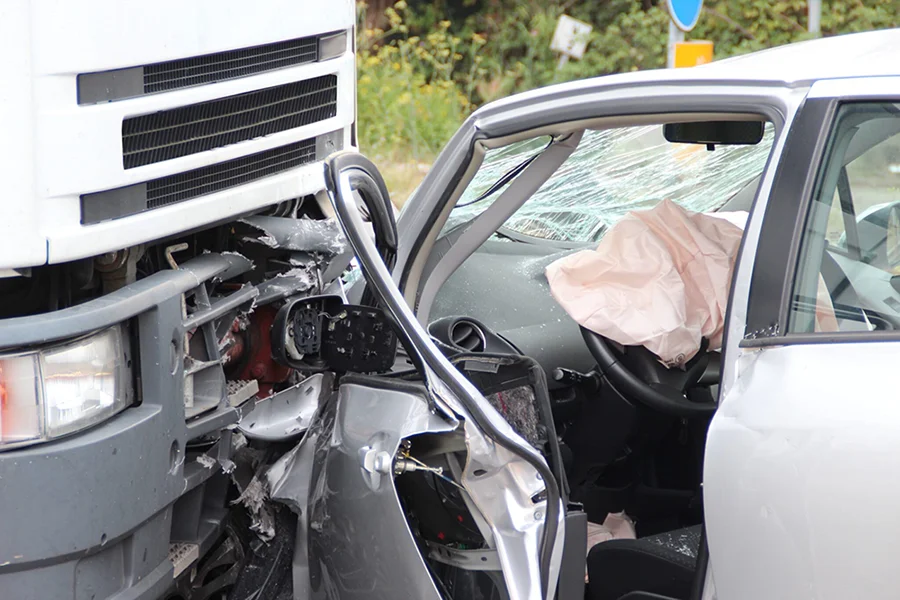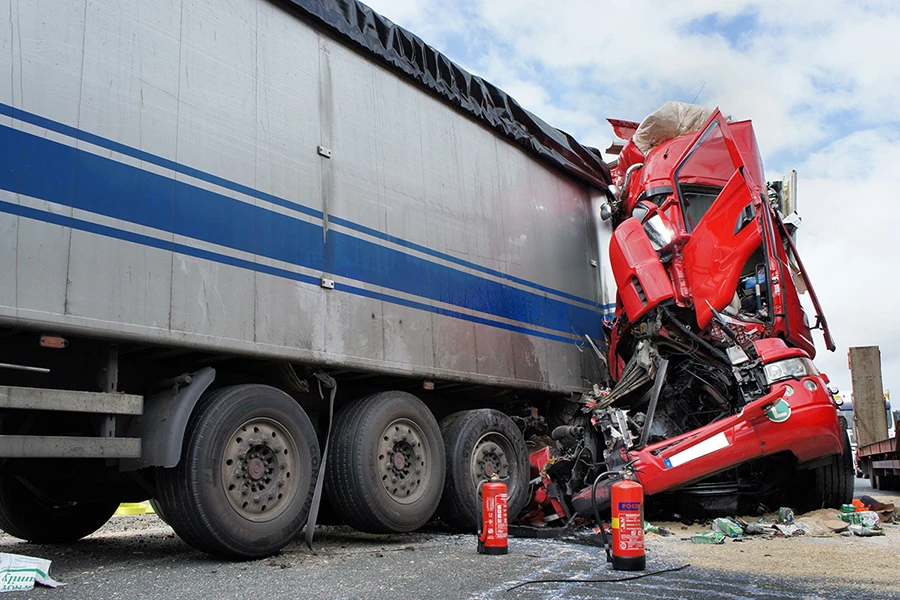Comparative Negligence & Missouri Trucking Accidents
By: Simon Law | July 17, 2023

Personal injury lawsuits help people pay for the injuries they sustain in unfortunate circumstances, and trucking accidents are no different. If you or a loved one suffers a severe injury in a truck accident caused by someone else, it only makes sense that you shouldn’t have to pay for your medical costs. However, what if the crash is partly your fault, how will Missouri courts handle the situation? Today, our commercial vehicle collision attorneys in St. Louis are going to explain how Missouri’s comparative negligence laws impact trucking accident outcomes.
Trucking Laws and Regulations in Missouri
The Missouri trucking industry operates under a comprehensive set of laws and regulations to help ensure safety on the roads. Here are some key aspects to understand:
- Truck driver qualifications: Missouri follows the Federal Motor Carrier Safety Administration (FMCSA) guidelines for truck driver qualifications. These include requirements for drivers to obtain a commercial driver’s license (CDL), maintain a clean driving record, and comply with medical certification standards.
- Hours of service regulations: Missouri adheres to the federal hours of service regulations to prevent fatigue and further promote road safety. These regulations outline maximum driving hours and mandatory rest periods for commercial truck drivers based on the cargo type and distance traveled.
- Vehicle maintenance requirements: Trucking companies in the state are responsible for maintaining their vehicles to keep them in safe, operational condition. They must comply with regular inspection schedules, keep maintenance and repair records, and address any identified issues right away.
- Safety standards: Enforced safety standards for commercial trucks include regulations for vehicle size, weight limits, and equipment requirements. These aim to minimize accident risks caused by improperly loaded cargo, faulty brakes, inadequate lighting, or other equipment issues.
- Insurance requirements: Trucking companies are required to carry appropriate levels of liability insurance coverage. The policies help protect the rights of accident victims by providing compensation for injuries, property damage, and other related expenses.
Being familiar with these regulations is essential for understanding the legal framework that surrounds a trucking accident.
Missouri’s Pure Comparative Fault Law
Missouri follows what we call a “pure comparative fault” rule when it comes to determining liability in trucking accidents. In short, it means Missouri courts can find every driver involved in an accident partially liable for the crash. Once the court determines liability, it will dock the total amount of damages you can recover based on your percentage of responsibility for causing the accident. To help clarify how pure comparative fault works, look at the example below.
Suppose you suffer a severe injury in a Missouri truck accident. After hiring an experienced personal injury attorney and arguing your case, the court determines that your injuries deserve reparations of $200,000. However, during the crash, you were using a hands-free device to talk to friend. Based on this information, the court determines that you have shared responsibility in the accident and are 20% at fault due to distracted driving. As a result, your $200,000 accident compensation total is reduced by 20%, which means your total award is $160,000.
It’s important to note that Missouri’s comparative fault rule applies to all parties, even if one party is at fault for most of the accident. Therefore, if someone is at fault for 90% of an accident, he or she is technically still entitled to 10% of his or her damages.
Should you find yourself injured due to a truck accident, it’s important to take action right away as there is a statute of limitations for filling a personal injury claim in the state of Missouri.
How is Fault Percentage Calculated in Missouri Truck Accidents?
The fault percentage in truck accidents is typically determined through a legal process. This involves investigating the accident circumstances and considering various factors. In general, the fault percentage is typically made by insurance adjusters, attorneys, or a judge or jury, in the event the case goes to court. The evidence gathered during the investigation will be considered, such as witness statements, expert opinions, accident reconstructions, and any applicable laws or regulations. The percentage calculated may be adjusted and final payment can be based on several factors:
- Accident investigation: After an accident, an investigation occurs to gather evidence and determine the cause. This investigation may involve reviewing police reports, conducting witness interviews, examining physical evidence and performing damage assessment, and reconstructing the accident scene.
- Contributory negligence: The percentage of fault that is assigned to each party involved via the comparative fault rule directly affects their ability to recover damages. If the accident is determined to have been due to one party’s own negligence, it will reduce their potential recovery in proportion to their assigned fault percentage.
- Apportioning liability: Once fault percentages are assigned, accident liability and resulting damages is apportioned accordingly. For example, if the truck driver is found to be 70% at fault, they may be responsible for 70% of the damages, whereas the other driver holds 30% of the fault and responsibility for remaining damages.
- Impact on damages: The assigned fault percentages will also directly impact the amount of compensation each party may receive. Awarded damages are typically reducedby their assigned fault percentage.
The actual process to determine fault percentage can be quite complex and involve legal considerations specific to Missouri law. Because of this, it’s essential to consult with an experienced attorney and seek legal representation if you find yourself involved in a truck accident. With their extensive knowledge of Missouri regulations, they can help in proving liability and help contest potential legal ramifications.
Can a Passenger be At Fault in a Missouri Truck Accident?
In Missouri, it is possible for a passenger to be considered partially or even fully at fault in an accident. Should a passenger engage in negligent behavior directly leading to the accident, such as distracting the driver, grabbing the steering wheel, or interfering with the driver’s ability to operate the vehicle safely, they can be considered partially or fully at fault.
Representation Is Key
Due to Missouri’s pure comparative fault law, securing experienced representation for your case is crucial! A knowledgeable truck accident attorney can help you fight for your case, potentially decreasing your liability percentage while maximizing your recovery amount. If you want to talk to an attorney about your truck accident case, The Simon Law Firm is here to help!
If you or a loved one was injured in a Missouri trucking accident, call (314) 241-2929 now for a free consultation!


